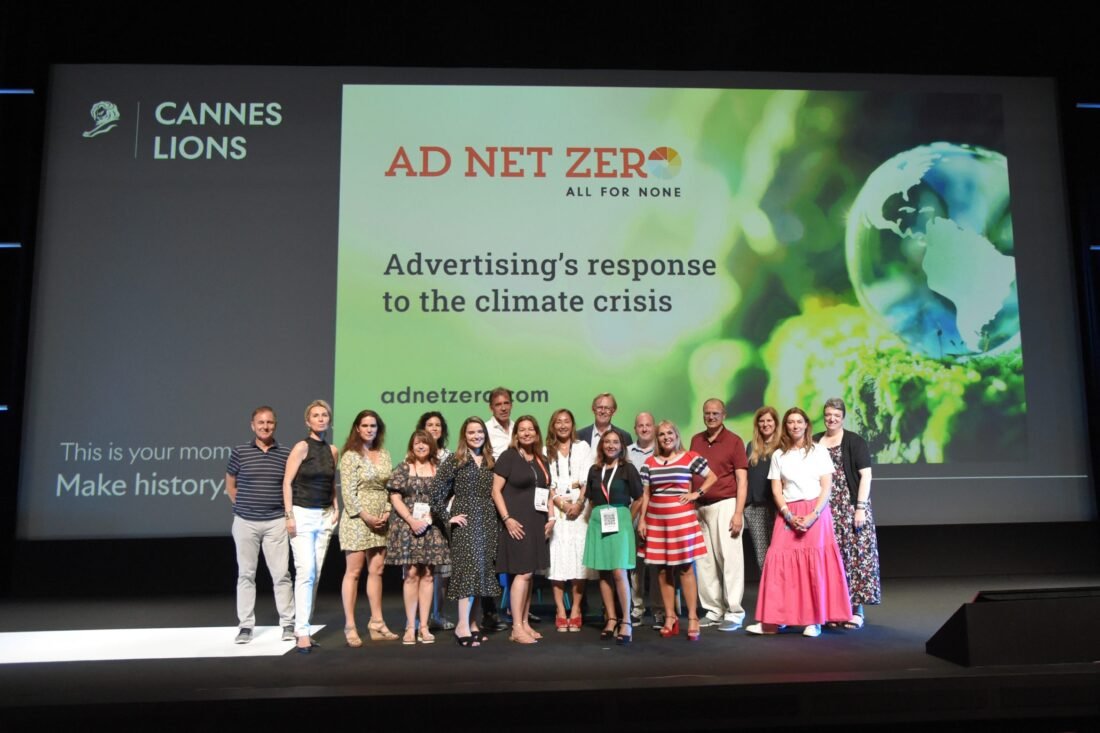Ad Net Zero Launches World’s First Global Media Sustainability Framework At Cannes Lions
- Supported by the likes of Google, L’Oreal, Omnicom, Publicis Groupe, Mastercard, Meta, Sanofi, Unilever, the framework provides a set of globaly, voluntary standards to calculate media emissions.
- Ad Net Zero invites agencies and advertisers from the Middle East to join the UAE chapter and contribute to national and global sustainability and net zero targets
- Ad Net Zero partners with Kantar on behaviour change tracking initiative
Dubai, United Arab Emirates – August 5, 2024: Ad Net Zero, a global climate action programme helping the advertising industry tackle the climate emergency, has recently launched the first iteration of the Global Media Sustainability Framework at Cannes Lions International Festival of Creativity.

The first iteration of the framework offers a series of voluntary industry standards to improve consistent, comparable measurement of greenhouse gas emissions from digital, television, print, audio, outdoor, and cinema channels. The new framework has been supported by some of the world’s largest advertisers, as well as the world’s six largest advertising holding companies, major media owners, tech companies and trade bodies, many of which have contributed to its development. These entities are 4As, The Advertising Association (AA), Alliance Digitale, ANA, Diageo, dentsu, EACA, Google, GroupM, Havas, IAA, IAB, IAB Europe, Indeed, IPA, IPG, ISBA, L’Oreal, Omnicom, Publicis Groupe, PubMatic, Mastercard, Meta, Sanofi, SNPTV, SRI (Syndicat des régies internet), Reckitt, Unilever, Union des Marques, and World Federation of Advertisers (WFA).
The framework is the outcome of a 12-month, GARM-led global engagement effort to build a series of common measurement processes and includes the first versions of formulae, as well as tools to help efficiently collect emissions data from companies throughout the media supply chain. Up until now, there has been no consistent, agreed upon industry-wide measurement framework.
The goal is to help every advertiser and their partners understand and take positive action to reduce the carbon impact of their media plans – in line with Action 3 of the Ad Net Zero Action Plan.
The work has been supervised and assessed for consistency with best carbon accounting practices by a Climate Science Expert Group including representatives from PwC, Brain Oxygen, Climate Impact Partners, BL Evolution and top climate experts from Unilever, Reckitt, and Diageo. A key foundation for the development of the formulae used in the framework has been provided by the Oneframe Initiative in France, with specific components provided by SRI, Alliance Digitale, SNPTV and UPE.
Click here to view the Global Media Sustainability Framework
Sebastian Munden, Chair, Ad Net Zero: “Today’s release of standard calculations for the carbon footprint of major media channels is a significant milestone for Ad Net Zero and the global ad industry. They are the starting point for creating a common currency for global voluntary adoption: a base for calculating reduction and accelerating progress. Concerted efforts to reduce the carbon footprint of media should go hand in hand with the efforts to support more sustainable choices to change the way we work and change the work we make. The ad industry has the business opportunity of a generation to be part of the solution.”
Rob Rakowitz, Initiative Lead, Global Alliance for Responsible Media: “We are proud to support Ad Net Zero and help the group to create an essential foundation for the industry to benchmark their activities. We are hopeful that this work stemming from our uncommon collaboration will allow industry stakeholders to pursue a larger transformation in voluntarily reducing emissions stemming from media campaigns.”
Michael Todd, Global Director, Industry Relations, Google: “We are proud to have worked closely with the GARM and ANZ community to arrive at this important milestone. Standardization is a vital component in driving the industry towards making more sustainable media choices and bringing more clarity to this area is an important achievement. This has been a true team effort and we are excited to continue to work with GARM, Ad Net Zero and our partners to contribute to the next stage in this process to further refine the framework.”
Christy Cooper, Global Director of Industry Relations, Meta: “We are proud to be part of GARM and Ad Net Zero’s work to unify the industry around a global ads emissions measurement framework. We are committed to working with the industry and will be kicking off a process to evaluate solutions to provide this data to advertisers in the future as GARM’s framework evolves.”
Andy Powell, Co-Founder & CEO, Conscious Media: “We are proud to bring GARM and Ad Net Zero’s global emission measurement framework to our partners in MENA. All brands and agencies will now receive GARM data within our end of campaign reports for activity across our Conscious YouTube, Open Exchange and Green Marketplace offerings. There is no trade off when it comes to buying sustainable media, it offers both excellent performance and lowers carbon emissions, we’re excited to continue pushing responsible advertising in MENA, now backed with globally recognized measurement framework’
New reporting initiative to track advertising’s impact on sustainable behaviour change
As part of its efforts to harness the industry’s power to effect behaviour change at scale, Ad Net Zero has also partnered with Kantar, an international market research company based in London. The Sustainable Behaviours Advertising Tracker is a project between the Advertising Association, Ad Net Zero and Kantar to deliver a new regular report, based on work underway by Ad Net Zero under Action 5 of its action plan. The new report provides a quarterly and annual review of how and where sustainable behaviours feature within advertising campaigns. It offers a new level of insights to the advertising industry, with benchmarks across categories for the portrayal of more sustainable behaviours.





